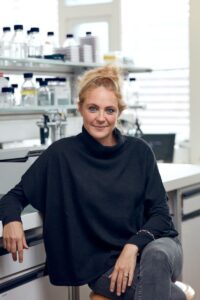Today, February 11, is the international day of women and girls in science. A pledge to dismantle gender stereotypes and to end the gender imbalance in science. Did you know that less than thirty percent of scientists globally are women?
When it comes to natural sciences like physics or chemistry, only 5 percent of all globally enrolled students for these subjects are female. Time to change, isn’t it?
We are so proud to conduct this interview with Prisca Liberali, Junior Group Leader at Friedrich Miescher Institute for Biomedical Research in Basel (Switzerland). At the same time, Prisca is also an Assistant Professor at the University of Basel. She holds a Ph.D. degree from the department of cell biology and oncology at Mario Negro Sud (Italy). Recently, she received the Friedrich-Miescher-Award 2021 for her research on design principles of tissue organization.
[vc_empty_space height=”50px”]
Interview with Prisca Liberali
Prisca, it’s a pleasure to have you virtually here. Could you briefly describe your function as a Junior Group Leader at the FMI institute?
Prisca Liberali: I am in charge of my lab of around 12 to 14 people, both Master’s students, Ph.D., and Postdocs. Together, we run the research program on different multicellular systems such as organoids and gastruloids.
On the other side, I am also teaching undergrad and graduate students at University Basel. In this semester, I give lectures about ‘multicellular systems’.
Why focus on organoids?
Why did you decide to focus on organoids and drug discovery?
Prisca Liberali: I am a chemist who moved to cell biology, looking at the population of cells. It was becoming more and more clear that looking at the full population of cells, to examine the full tissue, would be very important. This is why when I started my lab in 2015, we started working on intestinal organoids. We tried to recapitulate how they develop from mouse and human stem cells. They are giving us the chance to look at human development and diseases directly. This creates an incredible power for drug discovery and to answer fundamental questions in cell and developmental biology.
My fascination with science
At which age did you know what you wanted to study?
Prisca Liberali: It started very early. Since I remember, I was attracted to science in general. My interest was very broad, including biology, physics, and chemistry. I still remember the first electrical circuit I’ve built and my first science teachers. For me, it was obvious that I always wanted to do something with science. Around the age of 14, I figured out that I wanted to study chemistry.
Prisca Liberali about role models
Did you have a role model when you decided to study physical organic chemistry? If yes, who?
Prisca Liberali: There are the few women in history like Marie Curie who has pursued her passion for science. But still, there are not many female role models, especially when I was a teenager, which is a problem indeed. Also at the university, the number of female professors back then was really low. So, I was rather driven by curiosity.
Who encouraged you to choose a STEM subject?
Prisca Liberali: My father is an engineer, so he was eager to push me forward. My mom who worked in a different field encouraged and supported me to study a subject that I genuinely like. It was clear from the beginning that chemistry was something I always wanted to do.
How did it feel like to study natural science in a male-dominated course? Did you have to face prejudices related to your gender?
Prisca Liberali: There is this saying “A ton of feathers is still a ton”. There are a lot of little things that you don’t realize, especially if you are young. You tend to say that the people complaining are from an older generation. You start studying and some little things happen, then you accomplish your Ph.D., and some other little things occur. When you start accumulating, you realize that there is always something, that you are treated differently. People listen to you differently and there are also different expectations simply because of your gender.
There are always challenges.
First realizing it, then accepting it in the sense of understanding that you are not the problem, it’s the misogynist environment. For the current society, a much narrower behavior is acceptable for women. How many times have you heard that you are too ambitious or too quiet or too outgoing, etcetera. ?
What has changed?
You are an assistant professor at Basel University. If you compare your time as a student back then with female students now – what has changed?
Prisca Liberali: There have been changes for everybody, including the system. Women nowadays are much more aware of all the problems that can occur, for example, how difficult it can be to have a career and kids. On the other side, we have much more role models with very successful scientists combining careers and having children. When I studied, I did not think about possible problems or solutions. The awareness is bigger now.
Why study STEM?
Why should girls choose to study a STEM course?

Prisca Liberali: There are lots of reasons why you should go for a STEM subject. You are free, can work flexible, you can follow your scientific interest. You can find innovative answers to problems. Mentoring is also very important. In the lab, I work with people between 25 and 35 years. A great age to mentor people to help them to find their own way in professional life. And then there’s the science: You are discovering something for the first time. You can find innovative solutions or cure diseases. In the long term, it also gives a lot of flexibility for combining family and a career. Flex-time is a big plus.
Prisca Liberali’s advice for women in science
What would you recommend for women who’d like to pursue a career in science?
Prisca Liberali: Don’t be afraid, be bold and step out of your comfort zone. You only have one life.
Choose your mentor well, choose an environment in a lab that is good for your Ph.D. and postdoc, but also for PI. Look for a supportive environment, for mentors that guide you. If it’s not good for you, change it. It’s crucial to look for mentors from the inside and outside. Don’t be afraid of not having a straight-line career. You don’t have to go a fast race. Please think about why you want to achieve your Ph.D. What do you want to do after your Ph.D.? Do you want to work at the university or for a pharma company? It’s crucial to start thinking about it before completing your Ph.D.
Thank you for the interview!




